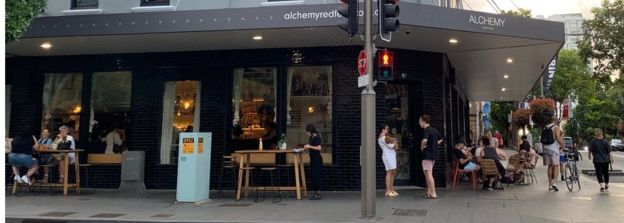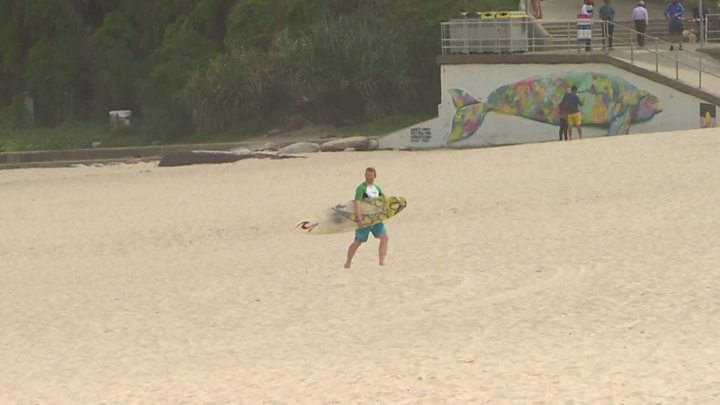Australia is shutting down non-essential services as coronavirus cases rise rapidly in the country.
Pubs, clubs, gyms, cinemas and places of worship will be shut from midday on Monday, while restaurants and cafes will have to switch to takeaway only.
Prime Minister Scott Morrison announced the restrictions after a national cabinet meeting.
The number of cases in Australia has risen sharply in recent days, reaching 1,315.
New South Wales (NSW), home to Sydney, is the worst-affected state with 533 confirmed cases. Victoria, of which Melbourne is the capital, has 296 cases, while Queensland has 259.
The new restrictions will see many businesses close but supermarkets, petrol stations, pharmacies and home delivery services will continue running.
The prime minister said he wanted to keep schools open but parents would be able to keep their children at home if they wished to do so.
“I don’t want to see our children lose an entire year of their education,” he said.
Some states, including Victoria, have signalled that they want to close schools.
Seven people have died across Australia so far from Covid-19.
The new measures come after large crowds gathered on Sydney’s beaches including Bondi on Saturday, flouting social distancing advice.
Mr Morrison said that the federal and state governments had decided to act because Australians were not obeying guidelines.
But he added: “We are not putting in place lockdowns that put people in and confine them to their homes.
“That is not a measure that has been contemplated at this point.”
Chief Medical Officer Brendan Murphy said people, especially the young, had to realise that they needed to live “very differently” and stop going out in order to control the virus.
In other developments:
- The prime minister announced new stimulus measures to boost the economy
- South Australia, Western Australia and the Northern Territory will close their borders from Tuesday. Under the new rules, anyone arriving will be forced to self-isolate for 14 days
- Tasmania, an island state, has already imposed similar travel restrictions
- The Australian Football League suspended its 2020 season, with no fixtures until at least 31 May. The women’s league has also been halted
- In contrast, the National Rugby League says it will carry on with matches as planned

Australians’ lethargy on social distancing
by BBC News reporter Frances Mao, in Sydney

Just hours after the impending shutdown was announced, I walked through an inner Sydney neighbourhood. It was a balmy Sunday evening and people were out at bars and restaurants perhaps unaware that this would be their last drink outside their homes for a while.
The measures are likely to hit Australians hard, and shock many out of the lethargy they’ve felt towards social distancing.
State restrictions had already ramped up this past week, as the case numbers doubled every few days. However, many Australians haven’t been paying attention to the statistics.
Instead, discussion has often centred around disruption to daily life – the inconvenience and tedium of working from home; the panic buying at supermarkets. While some – closely attuned to the crisis in the US and Europe – have been vigilantly isolating, others have been resistant to the message “stay at home”.
It’s why a blast of late summer heat on Friday drew so many out to Bondi Beach – the social isolation mantra hasn’t sunk in yet. There’s been little public education campaigning, and the constantly changing messaging from the government hasn’t helped.
It was only 10 days ago that the prime minister blithely said he’d still attend a rugby game, minutes after banning large gatherings outside. He later changed his decision. Australia had fewer than 200 cases then, it now has over 1,300.

What was in the financial package?
The prime minister earlier on Sunday announced a second stimulus package worth A$66bn, meaning the total financial package offered by the government and Reserve Bank now amounts to A$189bn (£94bn, $109bn).
Mr Morrison said financial support would be offered to those most vulnerable to the effects of the coronavirus crisis.
The measures include doubling income support for those on Jobseeker’s allowance while waiving asset tests and waiting periods.

Grants of up to A$100,000 will be made available for small and medium-sized businesses.
Individuals affected by the coronavirus will be able to access up to A$10,000 of their pension during 2019 and 2020. They will be able to take a further A$10,000 the following year.
Australian airlines and airports will meanwhile be provided with up to A$715 million in support.
Mr Morrison stressed that the measures cover the next six months. “This is not a quick fix,” he said. “This will not be my last visit to the podium. There will be more packages and more support.”
What’s happening in Asia?
Singapore has announced it will ban all short-term visitors under new coronavirus measures. Short-term visitors are also banned from transiting through Singapore. Only work pass holders who have healthcare and transport will be allowed to enter, along with their dependents.
The city state confirmed on Saturday that two people had died from Covid-19, the first virus related deaths in Singapore.
China reported 46 new cases, all but one brought in from other countries. The one domestic case was linked to a previous imported case, according to local authorities.
South Korea reported 98 new cases on Sunday. The figure suggests a downward trend in new cases. The total number of coronavirus cases in South Korea has now reached 8,897.
Credit: Source link